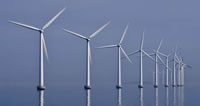Wind power fiercer than expected, study finds
 Phys.org: University of Delaware researchers report in a new study that offshore wind may be more powerful, yet more turbulent than expected in the North Eastern United States.
Phys.org: University of Delaware researchers report in a new study that offshore wind may be more powerful, yet more turbulent than expected in the North Eastern United States.
The findings, published in a paper in the Journal of Geophysical Research: Atmospheres, could have important implications for the future development of offshore wind farms in the U.S., including the assessment of how much wind power can be produced, what type of turbines should be used, how many turbines should be installed and the spacing between each.
The study, led by Cristina Archer at UD and Brian Colle at Stony Brook University, analyzed historical data from 2003-2011 at the Cape Wind tower located near the center of Nantucket Sound off the coast of Martha's Vineyard, Massachusetts, and collected complementary data at the same location in 2013-2014.
Co-authors on the paper, titled "On the predominance of unstable atmospheric conditions in the marine boundary layer offshore of the U.S. northeastern coast," include UD professors Dana Veron and Fabrice Veron, and Matthew Sienkiewicz from Stony Brook.
The paper's main finding is that atmospheric conditions around Cape Wind are predominantly turbulent, or unstable, which is in stark contrast to prevailing data from European offshore wind farms in the Baltic Sea and the North Sea. European studies of offshore wind document that atmospheric conditions there are predominantly neutral— meaning neither too windy nor too still, but somewhere in the middle, with unstable wind conditions occurring only 20 percent of the time. Cont'd...
Comments (0)
This post does not have any comments. Be the first to leave a comment below.
